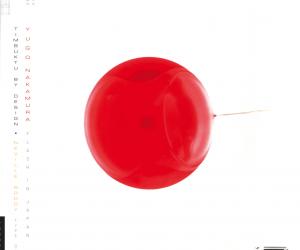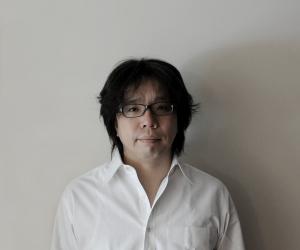First Published in

Yugo Nakamura is an internationally celebrated as a Flash 4 guru. The 29-year-old Tokyo native insists that it is the creativity of a designer that defines the potential of expression, not the sophistication of the tools.
Self-taught in interactive design, Yugo studied landscape art and architecture at the University of Tokyo and spent some years as an architect and engineer at a consulting company in Japan. Now the structural engineer turned web designer maintains a site called "MONO*crafts"(https://www.yugop.com), which demonstrates a most original interactive interface using Flash 4 technology. The site won the "Best Interactivity" award at flashforward2000 San Francisco.
He is also working on music sites, Japanese artist sites and some experimental sites where he is making musical toys, CD-ROMs and other new media, and all of his upcoming work will be linked from the MONO*crafts site.
What excites you about Flash technology?
I am not really interested in Flash as a mere animation tool. I use Flash because of its programming possibilities, ability to integrate with graphical images, good browser compatibility and because it is easy to use.
Some people feel that designers are often drawn to Flash because of its multimedia capabilities at the expense of other demands of a client's brief. In other words, Flash is often misused or used to build sites where other technologies might have served the client's needs better.
What is your opinion on this issue?
I agree with some of it. In the light of current Web systems, creating a site with ordinary HTML and XML technology ensures effective information media. Up to now, developing a site by using Flash meant that sacrifices had to be made in other areas. We must bear this in mind. We should also remember that Flash is a mere tool like any other Web technology. It is important to know how to use tools freely, but dependency on a specific tool leads to meaningless results.
On the other hand, I feel strongly that where the Web is used as media, it should always involve new experiences and excitement. I like to satisfy my desire to present something interesting that has not been seen before, even if it is at a cost. When I work with a client who feels the same, I will go ahead and do what I want to do. Each case is of course judged on its own merits.
People across the globe are responding enthusiastically to your work - you won the Best Interactivity Award at flashforward2000 in San Francisco. What do you think is the appeal of your approach?
I myself question whether my achievement is so great. Regarding yugop.com, I spend lots of time keeping it simple while constantly improving the quality. I would be delighted to know that these aspects were appreciated
Does the future of the Web lie with Flash?
I don't think so. As I mentioned earlier, Flash is merely one of the tools available. If new and better technology emerges, I will use it.
Do you work alone or do you work in a team of programmers / designers?
I work on my own for Yugop.com, but I collaborate with a team on work for clients.
Do you see yourself more as a programmer or more as a designer?
I think my work is to create something by using various and integrated technologies such as programming and graphic design. In view of this, it might be appropriate to call myself an architect.
What else about the Web excites you or do you spend all your time perfecting your Flash skills?
I like taking photographs. This aspect is becoming more and more exciting as new possibilities for using photographs on the Web are emerging.
What is your definition of creativity in technology?
I am more interested in the possibilities technology creates than in technology itself. I think the source of my inspiration comes from the creation of new websites through the use of Web technology, rather than from the technology itself.
Where do you draw inspiration from?
I explore various Web activities and movements in the field of media art, but the influence of ordinary landscapes and its movement is also very important to me. For example, the landscape around you becomes totally new after you see a play or a movie. I think this kind of experience is of utmost importance.
Do you do any client work? For whom?
Apart from MONO*crafts, I belong to the newly established BusinessArchitects (https://www.b-architects.com) which employs about 40 people. This is where I do work for big Japanese corporate businesses. At MONO*crafts I work on my own whenever I think I can do something experimental and interesting. But it is very difficult to give my full attention to two businesses and my work at MONO*crafts tends to cause delays. My next task is to find out how to incorporate the work of two businesses into my life at the same time.
What is your vision for MONO*crafts?
At the moment I don't have much time for MONO*crafts because of other work commitments. But I am happy to do any work where I can create exactly what I want to.
You made quite a transition from Architecture to New Media Design. Did this require a major change of mindset for you or did you find the disciplines complementary?
I used to be involved in very big projects, such as the construction of bridges across more than 600 meters of water. I think I had the basic ability to be an Engineering Architect. I worked in the design office. The industry requires vast experience, so at the time I was very frustrated with myself because I had only 4 years experience.
I am extremely happy with my situation at the moment as I can create what I want, but I also believe that most of my work will disappear from the server, as this is the nature of Web media. The effort I put into my previous work was enormous and once completed, it would remain for a very long time.
It took much courage to leave this work behind. I think about what could have happened if I had not abandoned it. I want to create something that will last forever.
Where did you get funding to start a new venture and was it a difficult process?
A new venture sounds exaggerated. I merely created a site, so there were no financial difficulties.
What has been the most exciting project you have worked on and what did it involve?
I have not done enough work to look back at my past. I think the most exciting work is what I am working on currently. I am also quietly working on upgrading Yugop.com - this will also be very exciting.
What is your dream brief / project to work on?
My dream is to be involved in bridging the gap between existing areas of physical design and new disciplines emerging from the Net.
Do you own a Playstation?
Yes, I do.
What is your favourite game?
Ridge Racer*. I am only interested in racing games.
P2 can read Flash. Are you at all interested in getting into programming more advanced Flash games?
As far as games are concerned, I am the only professional who can play ;-)
Japan has made a significant contribution to the world in different design disciplines (fashion, motor vehicles, electronics, products and so on).
Do you personally feel any pressure to advance that agenda /reputation, especially as an exponent of a new form of communication - that is, new media?
I feel no such pressure. I regard myself as one of millions in the Web design community. All I do is occasionally produce the best design I can.
What do you think is a creative artist's duty or obligation to his cultural creative tradition, if at all?
I have never thought about duty and obligation.
What is the "Japanese" creative ethos in this age?
It is difficult to put it simply, but it must be very complex.
In your opinion, what is the ultimate (best) in Japanese design? Why?
(Yugo did not provide an answer to this question).
What is the state of web design / development as an industry in Japan at the moment?
I think it is good technically, but in terms of design Japan has a lot to learn. In Japan, the computer game culture is far advanced but the Web is relatively low-key. This is perhaps why creative people are not involved in Web business.
Japan is seen by many outsiders as a curious mix of traditional values and modern thinking. Do you find the two conflicting or complementary to each other?
I don't think these either conflict with or complement each other. I rather think each one is floating in the air.
Which side do you lean more towards?
I don't take aspects of traditional culture into consideration.
Tell us why.
I am sure there is some sort of traditional basis on which to model myself, but there is a risk that the basis will distort as soon as I analyse myself and try to express it. Somewhere, unconsciously, something comes to me naturally. I think this is a traditional element which forms us. Whenever foreigners say "This part of your work is very Japanese", it leads to very interesting self-discoveries for me.
Do you know Karate?
No. When I was young, I was chopped by a Karate practitioner and had the horrible experience of not being able to breathe for about a minute.





